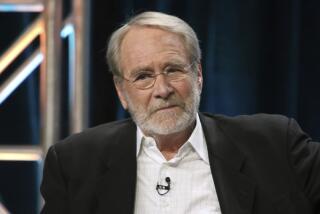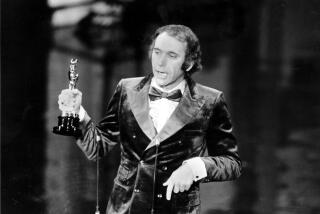MURROW: HIS LIFE AND TIMES by A. M. Sperber (Freundlich: $22.95; 816 pp., illustrated)
- Share via
In the 21 years since Edward R. Murrow’s ashes were scattered over the glen of his farm in Pawling, N.Y., two massive biographies have been written. The latest, by Ann M. Sperber, exceeds the first by nearly 300 pages. Copious as both are, they will probably not be the last accounts of Murrow’s life, since even this early, it has become clear that he is a man for the ages. There has not been a journalist of his size before or since, and it may be a long while before we see his likes again.
What Murrow was, how he got that way, the complexities of his character, the national issues which affected him and which he in turn affected, his penchant for taking risks, his swings of shyness and boldness, his steely devotion to principle, his charm, his capacity for anger, his success (highest paid journalist in the world), his zeal to defend underdogs and pariahs, his depressions, his fierce loyalty to those who worked with him, his stubborn integrity, his crowded galleries of friends and enemies, his mental and physical sufferings--all are soundly researched and presented.
To Murrow’s buffs, a comparison of this biography with Alexander Kendrick’s 548-page “Prime Time” (1969) is inevitable, but it casts no shadow on Kendrick to say that Sperber goes beyond him--not in the quality of writing, but in a wealth of material drawn from sources unavailable earlier, including newly declassified FBI and USIA files, CBS corporate documents, BBC archives and fresh interviews.
It is understandable, perhaps commendable, that biographers of Murrow should show emotion, there being no special merit in total detachment and crispness when writing about a man who placed far more emphasis on doing right than well, and who at a time of cross cowardice, put spine and conscience into a medium born without either. Sperber writes of Murrow’s many acts of generosity (“a near-compulsive bestower of gifts and little kindnesses”); his modesty, (“Almost excessively praised, he could be excessively thankful, writing people of no particular importance, in the midst of wide public adulation, (to express) ‘grateful appreciation and encouragement’ ”); his self-deprecation (“my tinfoil reputation”); his prophetic vision (concerning U.S. Vietnam policy before Dienbienphu, he warned “We may be led into a disastrous situation,” and, after the French were beaten, “We will inherit the mess”); his outspokenness on all subjects, including a speech before a convention of broadcasters, castigating television for “decadence, escapism . . . being used to distract, delude, amuse and insulate us.”)
Most of the highlights of Murrow’s career, including his differences with Frank Stanton and William L. Shirer, and the now classic defoliation of Sen. Joseph McCarthy, have been made familiar by Kendrick, Erik Barnouw and others, as well as by a recent and controversial TV special, but there are new insights, emphases and events here, including the case of Joseph Julian, a gifted and successful actor who found himself unemployable after his name appeared in the blacklist-generating “Red Channels.” Julian decided to sue the publisher for libel. He bumped into Murrow in a restaurant one day and asked him if he would appear as a witness for him at the trial. Without a moment’s hesitation, Murrow, friend of the titans of broadcasting, Galahad to millions of listeners, a favorite of Winston Churchill, the toast of every enlightened journalist in the world, answered, “Just say when and where, Joe.” The trial turned out to be disastrous because Judge Irving Saypol, making “no pretense of impartiality,” effectively muzzled Murrow. However, what no judge could expunge from the record was Murrow’s gallantry in volunteering to help a jobless actor when nobody else in the industry would raise a finger.
One measure of Murrow’s nature and stature, and a basis for comparing him to any broadcast journalist of today, lies in the cumulative record of issues to which he addressed himself, and in the positions he took. Sperber shows that quite apart from his celebrated reportage from London and elsewhere, and his epochal McCarthy broadcast, he injected in a politically timid, entertainment-oriented medium, programs dealing powerfully with suppression of civil liberties, the uses and abuses of congressional investigative practices, citizens’ rights under the Fifth Amendment, the connection between red-baiting and anti-Semitism, the concerns of black America, the question of a proposal to blockade the Chinese mainland, and other matters of civic and political importance. When he was given the Albert Einstein Prize in the humanities for having supported victims of Nazi persecution, he sent his award check to the author Alan Paton, then facing trail in South Africa. He attacked the loyalty oath as “a very stupid thing,” criticized “the American practice of dismissing all Russian suggestions for parleys as mere propaganda,” and in 1960, warned that, thanks to TV, “the voter may elect to purchase the second-rate idea--he may vote for Profile rather than for Principle . . . in the age of television, a politician to be popular must not be too complicated . . . he must be able to avoid the difficult question without appearing to do so.”
“Murrow” is an important book on every level--history, biography, morality, relevance to the concerns of today and to problems that will not go away tomorrow or the day after. If occasionally there is a bit of bumpy syntax or a missing shard of information, they are small and insignificant cavils against the broad, tumultuous, colorful and dramatic canvas of the life and times of a public figure whom Sperber justly calls “a culture hero.”
Not least among the qualities that make Sperber’s book compelling, are the frequent appearances of people of lower visibility than the stars and superstars who necessarily crowd the mural. Especially Joe Wershba, who contributed importantly to some of Murrow’s greatest productions, including the landmark Radulovich program that obliged the Air Force to back down from a judicial atrocity. Of this program, Sperber writes, “It was commercial television, 1953, handling, suddenly, the hottest political potato of the time--not in euphemisms, not through debates or surrogates but directly; not in retrospect but at the height of the national obsession and over a medium dependent for its license on a government that had partly caved into and partly fanned the hysteria. A half hour of undiluted controversy.” According to Sperber, Murrow in his last years “seemed to take special pleasure in talking to Wershba,” and indeed it is Wershba who has the last word in the book.
“Murrow” was 12 years in the making. It was time well spent.
More to Read
Sign up for our Book Club newsletter
Get the latest news, events and more from the Los Angeles Times Book Club, and help us get L.A. reading and talking.
You may occasionally receive promotional content from the Los Angeles Times.










